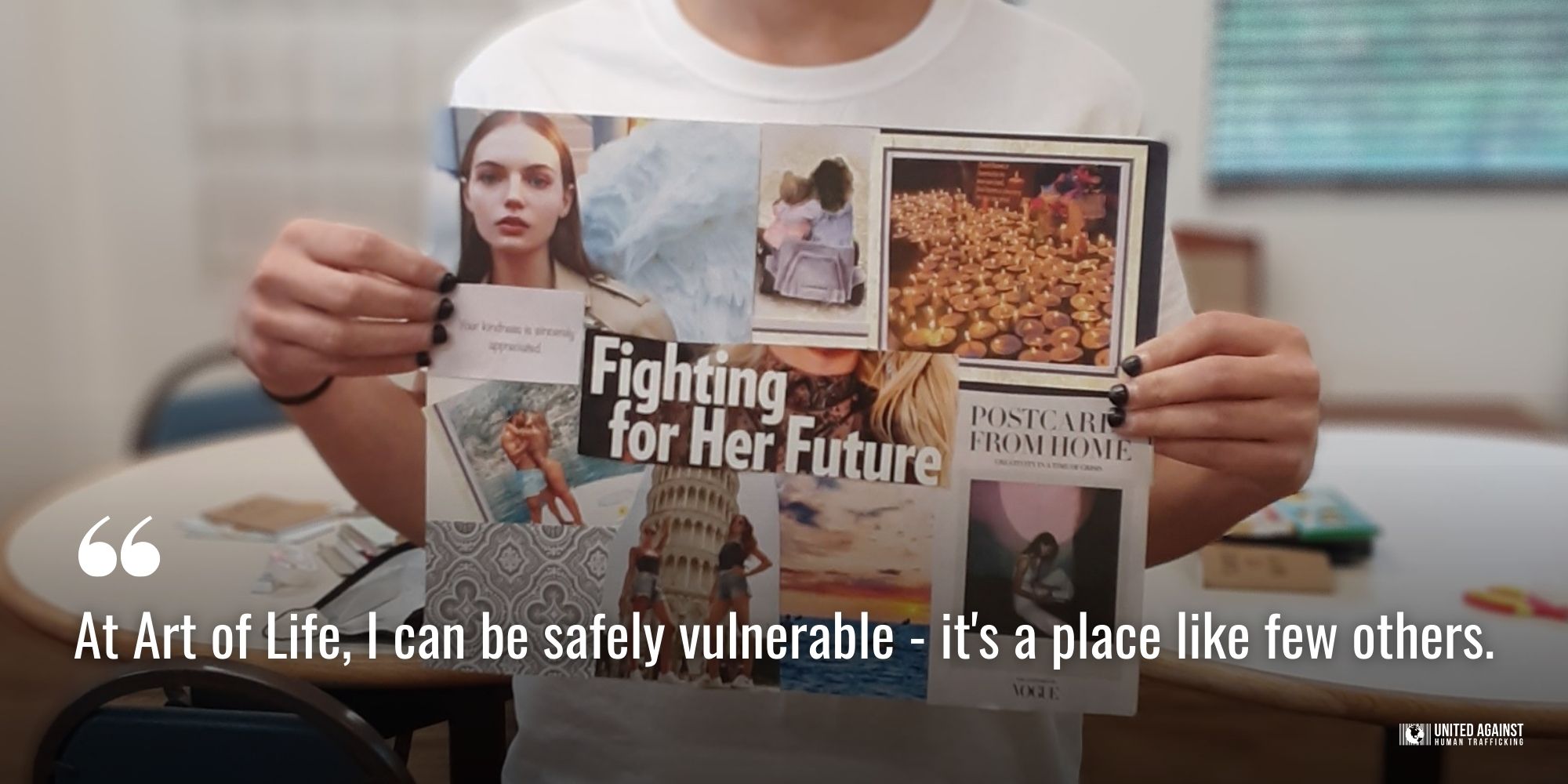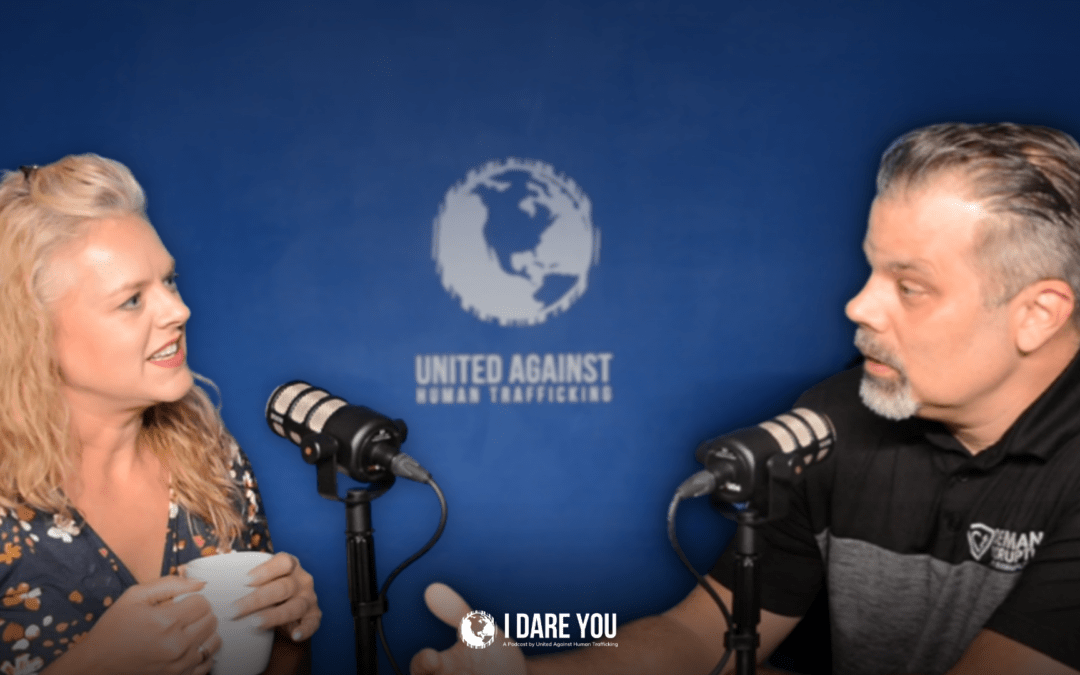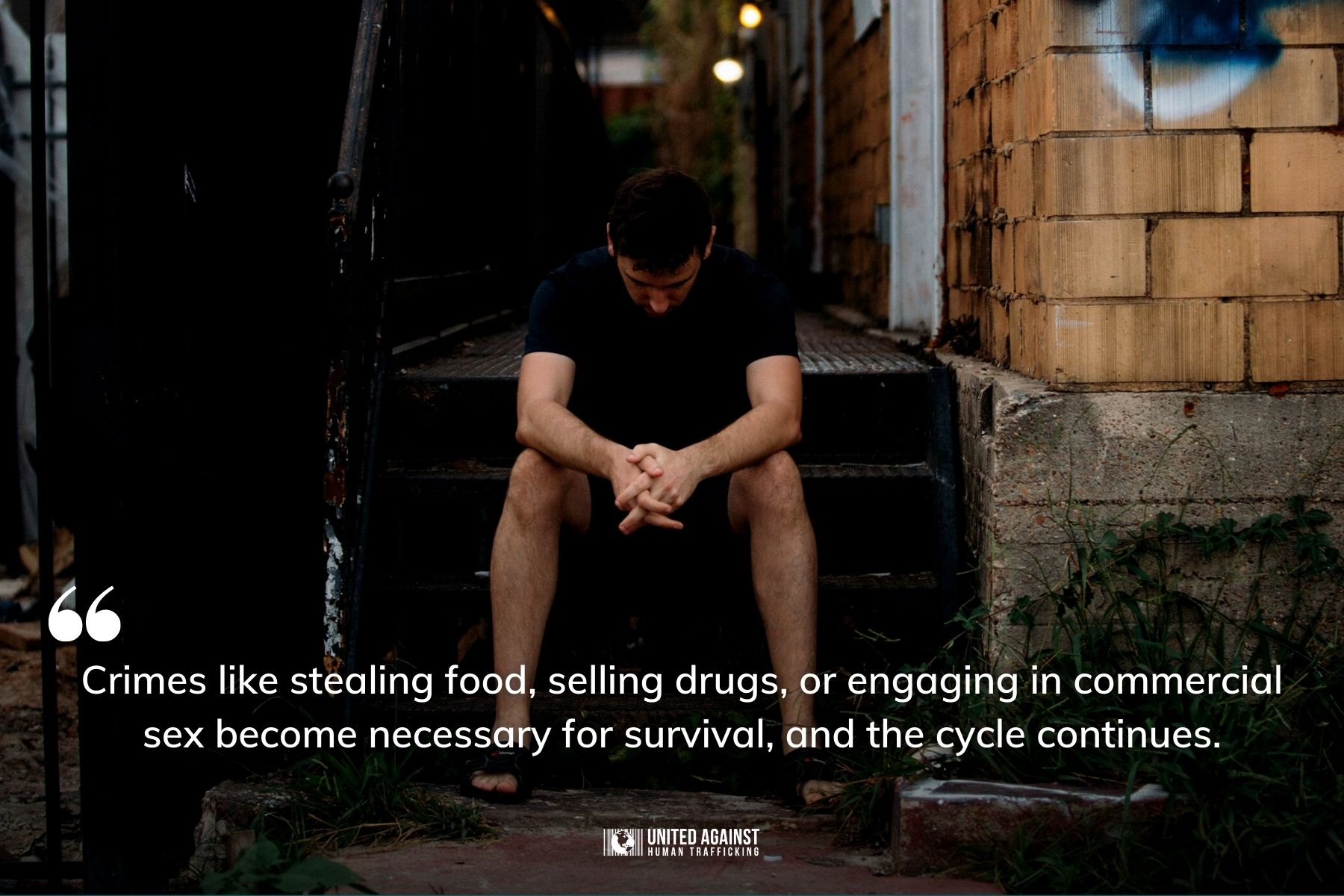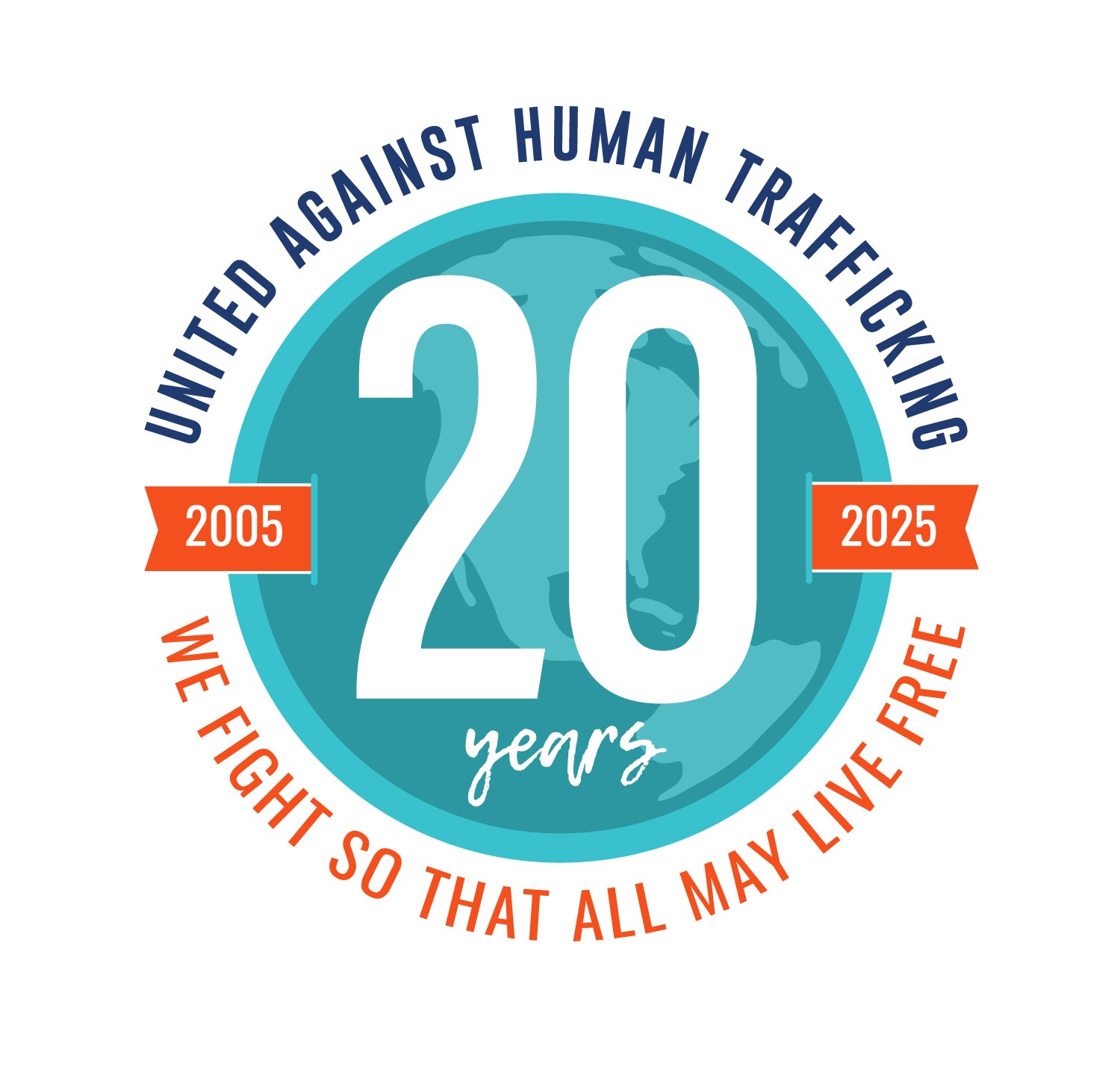


PODCAST – Houston’s Human Trafficking Problem and Solutions (Part 1)
You’ve probably heard it said that “Houston is #1 for human trafficking,” but is it really? Where did that statistic come from? Is it trustworthy? What is the City of Houston doing about human trafficking?
Director of the Mayor’s Office of Human Trafficking and Domestic Violence, Minal Patel Davis, and UAHT Chief Executive Officer, Timeka Walker, discuss how Houston got its reputation for being “#1 for human trafficking,” why that’s not necessarily true, and how Houston became an anti-trafficking model for cities across the globe.

Write Freedom in the Lives of Human Trafficking Survivors
Imagine being alone in a small apartment in a small town.
You don’t know anybody, and your family is miles away grappling with their own challenges. What do you do?
For Patty* the answer is creating jewelry.
Bracelets, necklaces, earrings. Beautiful things on bead and glass that shimmer in the light. But they aren’t for her. They’re for her teen daughter Nessie.

Both mother and daughter are survivors of sex trafficking.
Patty’s experiences and trauma ripped her from her family. Nessie’s experiences and trauma caused her to develop dangerous coping behaviors that sent her to juvenile detention.
Miles and miles separate Patty and Nessie.
Nessie is in the city. But Patty’s safe home is tucked away in what seems like the middle of nowhere – with nothing to do, nowhere to go, and no one familiar. Refusing to give up hope and determined to overcome her trauma, Patty discovered a way to stay connected to her distant daughter: jewelry making.
Her racing thoughts dissipate and organize as Patty strings together silver wire and feathers, smooth stones, and glass beads.

Her painful memories of trauma fade, her hands work nimbly, her breathing steadies –
all as she imagines the moment when she can see her daughter again.
UAHT’s new Art of Life class is for survivors just like Patty.
Creativity allows the mind to process thoughts, emotions, and experiences in a way that traditional therapy often cannot accomplish.
With support from wonderful volunteers and donors like YOU, clients explore their artistic side through collages, painting, journaling, figure drawing, and much more – holistically healing their mind and soul. Art of Life provides a place to be “safely vulnerable, a place like few others,” as one survivor participant so eloquently put it.

Nessie earnestly anticipates packages from her mother while working through her own trauma.
She wears Patty’s handmade jewelry as a reminder of their unwavering love. Still, shipping the occasional gift to Nessie isn’t enough.
Patty longs to embrace her daughter again, no matter what.
That’s why people like you are so important! When you give a gift, you help prepare survivors like Patty for their reunion with the ones they care about most.
Patty escaped her trafficking situation a few months before she started working with UAHT. She met Case Manager Erin through one of our clients. The established client was so confident in the program that she felt comfortable recommending UAHT to a fellow survivor.
When you give a gift to UAHT, you help prepare survivors to reunite with their loved ones.

Today, Patty is diligently following her case management service plan with one goal in mind:
reunification with Nessie. Case Manager Erin is with her every step of the way: empowering Patty to stick to her goals, coaching her to develop the skills necessary for finding a job, and ensuring she gets the best care possible from UAHT and our partners.
Patty now has access to remote weekly therapy as one of the many holistic supports she will receive over the course of her work with Erin.
She looks forward to meeting fellow survivors face-to-face in supplemental peer groups – people who share her experiences and can act as a support network for years to come. Not to mention starting Art of Life!
We are delighted to report that Patty will soon move from supportive housing to her own space!
She will start working and, in her free time, continue creating dazzling adornments to send to Nessie. Patty keeps Case Manager Erin up to date on her progress, and Erin could not be prouder of the significant steps she’s taken toward recovery!

Patty’s incredible journey is proof that even in the worst of times, you can find love and beauty –
beauty like the jewelry Patty crafts for her daughter. Beauty like reuniting with family after a long time spent apart.
With your help, UAHT can continue supporting survivors like them to maintain their strong connection.
Our case management program celebrated its 1-year anniversary in May and has directly served over 70 survivors… and counting!
Case management is a comprehensive and vital way to help people who have experienced human trafficking. UAHT is ready to respond to any issue a client may have,
from providing basic needs such as food and clothing to helping craft monthly budgets and resumes.
It is our sincere hope that you will consider giving to ensure 2022 is our best year ever for serving clients. The need is great, but we can accomplish our goals together!
Please, make your year-end gift to empower human trafficking survivors today.
And as always, thank you for being an ally in the fight for freedom!

How Natalia Found Freedom from Jail through Case Management
Despite being free from her trafficker, Natalia struggled to stay safe while waiting for her apartment application to be approved. Her brain insisted she wait for the apartment, but her heart slammed against her chest and her stomach felt like a wrung-out rag. An uncertain future made her feel stuck with no other choice but to return to the person who once met her needs: her trafficker.
Back in the Life of sex trafficking, Natalia was arrested for soliciting.

But when the Judge and District Attorney learned that Natalia is currently receiving care from our Case Manager Erin, they released her from jail.
And, as of October, Natalia qualified for an apartment and moved in!
Natalia is only one of many individuals currently receiving care in our case management program. Dozens of survivors are finding safe housing, attending support groups, and starting new jobs thanks to Erin’s support, encouragement, and care.
Healing from trauma and starting life over again are not easy tasks. It’s so tough, in fact, that most survivors return to the Life many times before breaking free for good.
What makes the difference between getting stuck in a cycle of exploitation versus breaking free? A support system.

“[My clients] know what they need, they know what they want, and they know how to do it. They just need encouragement to get there,” Erin reflected.
That’s why having a trained Case Manager is a gamechanger for survivors on their journey to reclaim their lives.
Erin calls her clients frequently to check in and make sure they have everything they need. If they don’t, she ensures they get it. She picks up groceries for them and helps complete police reports. She tells her clients she’s proud of their progress and reminds them to be proud of themselves, too.
And YOU, our amazing supporters, make it possible for over 30 clients to have Erin as a partner and guide through their complex, daunting journeys.
Because of you, Natalia is out of jail, healing, and forging a free future. THANK YOU!

PODCAST – Why Do Men Buy Sex?
In this two-part, thought-provoking episode, founder of Demand Disruption Joe Madison digs into why men watch porn and purchase sex… and how they can break free.
Take Action:
Lead tough conversations with empathy language – whether its with your child, your niece or nephew, or sibling.
Create a safe space where they can come to you.
Learn more about Demand Disruption

Let’s Be Real: Developing Self Confidence in Incarcerated Youth
“I have way more potential than I ever realized and I only learned that because of you.”
– Elijah, Age 15
Incarcerated youth face countless obstacles before, during, and after imprisonment that make them an easy target for human trafficking.
Breaking free from the “bad kid” mentality and developing self-confidence can pivot the trajectory of their life away from crime and exploitation and toward freedom.
Youth in Juvie Face Countless Hardships that Traffickers Can Exploit.
Many minors are incarcerated for crimes committed while trying to survive or reacting to trauma.
Youth who lack caring parents, food security, a consistent place to live or who are victims of violence don’t have the resources they need to be safe or make healthy decisions.
Homeless youth often resort to stealing food, selling drugs, or engaging in commercial sex to ensure they eat today or have a place to sleep.
Trauma responses include fight, flight, and freeze. For a teenager, these responses might manifest as getting into fights or truancy from school. These could land the teen in Juvie.
- Let’s be real: Youth are often incarcerated because something critical was missing in their life.
- Let’s be real: Child sex trafficking victims are still being arrested for being exploited.
- Let’s be real: Just as in adult prisons, African American and LGBTQ children are overrepresented in Juvenile Detention Centers.
All kids in Juvenile Justice have experienced trauma.
Already without support, incarcerated youth are additionally traumatized by being incarcerated.
We mostly hear about these young people as numbers and statistics, rather than as human beings with complicated experiences and emotions. Teachers, parents, friends’ parents, judges, prospective colleges, and employers reduce them to “bad kids.”
Eventually, youth come to believe what everyone around them is saying: I am bad and unworthy of a better life.

Leaving the Juvenile Justice system can be just as traumatic and challenging as entering it.
If the teen comes from an abusive family, going home can be dangerous. Without good grades, school attendance, or a reference, getting a job becomes almost impossible. They may not have the funds to pay for therapy to address their trauma.
It is likely that their basic physical, emotional, and mental needs will not be met. Crimes like stealing food, selling drugs, or engaging in commercial sex become necessary for survival, and so the cycle continues.
A person with low self-worth, unaddressed trauma, and a criminal record is easy for traffickers to prey on.
- Let’s be real: A stay in juvenile detention increases a young person’s likelihood of committing a felony by 33%
- Let’s be real: Incarceration is common among trafficking survivors. One study revealed 91% of trafficking survivors had been arrested.
- Let’s be real: Traffickers prey on people with exploitable vulnerabilities like homelessness, lack of familial support, and a criminal record.

How Self-Confidence Helps & How We Help Build It
We provide a free program called Real Talk in Juvenile Justice centers. This discussion-based program helps incarcerated youth break free from the narrative that they are stuck being “bad kids.” It allows them to acknowledge their trauma in a way that helps them build self-confidence and a better life.
One of our favorite parts of the program is the Acknowledgement Exercise. A UAHT facilitator reads a statement and everyone who relates to it raises a hand. For many, it is the first time they ever acknowledge the trauma:
- I have a family member who has been incarcerated.
- I grew up in a neighborhood where prostitution, gangs, and violence are common.
- I’ve lost someone due to drugs or alcohol.
- I’ve been failed by a teacher or counselor.
- I hide my emotional pain.
- I feel stuck the way I am.
This exercise helps participants connect the circumstances surrounding them to the emotions within them and the actions they make. Through Real Talk, incarcerated youth realize they have the capacity to grow and build a thriving life.
“We can tell that YOU are real with us. You don’t put on a façade… you don’t try to be super authoritative and phony. You don’t just tell us what we want to hear. You’re real with us.”
“In a lot of other group sessions, I try and just say what they want to hear. But in your trainings, I feel safe to share what’s real because I know you won’t judge me.”
So far this year, we have helped over 226 individuals address their trauma and build self-confidence through our Real Talk program! We are honored to step into the lives of youth who have been incarcerated and empower them to overcome their vulnerabilities, to stay out of exploitation, and to build a thriving life.
